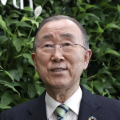
The Honorable BAN Ki-moon
President & Chair, Global Green Growth Institute; Eighth Secretary-General (2007-2016), United Nations
On February 20, 2018, Mr. Ban Ki-moon was unanimously elected as the President of the Assembly and Chair of the Council by the two respective governance organs of the Global Green Growth Institute (GGGI). His leadership has been instrumental for the Institute to help its Members adopt the green growth—environmentally sustainable and socially inclusive—model of development.
In addition to leading GGGI, Mr. Ban is Chairman of the Ban Ki-moon Foundation for a Better Future, and he currently serves as the Chair of the Boao Forum for Asia. Along with the former President of Austria Mr. Heinz Fischer, he serves as Co-Chair of the Ban Ki-moon Centre for Global Citizens. Mr. Ban is also the Chairman of the International Olympic Committee Ethics Commission, and he serves as Deputy Chair of The Elders, an independent group of global leaders established by President Nelson Mandela.
Prior to the current appointments above, Mr. Ban served two consecutive terms as the Eighth Secretary-General of the United Nations (UN) from 2007 to 2016, during which time he worked to build bridges, to give voice to the world’s most vulnerable and marginalized people, and to bring transparency and effectiveness to the UN. He successfully initiated global action to combat climate change that culminated in the adoption and rapid entry into force the landmark Paris Climate Change Agreement in 2016. He worked closely with member states to shape the 2030 Agenda for Sustainable Development and to establish UN Women, the latter of which advances global gender equality and women’s empowerment. He also led major efforts to strengthen UN peace operations, protect human rights, improve humanitarian assistance, prevent violent extremism and revitalize disarmament activities.
Prior to leading the UN, Mr. Ban was Minister of Foreign Affairs and Trade of the Republic of Korea. His 37-year career as a diplomat included postings in New Delhi, Washington D.C., and Vienna, as well as key responsibilities for a variety of portfolios, including as the Foreign Policy Advisor to the President, the Chief National Security Advisor to the President, the Vice Minister of Foreign Affairs and Trade, the Deputy Minister for Policy Planning, and the Director-General for American Affairs. Mr. Ban contributed significantly to issues relating to inter-Korea relations and WMD proliferation by serving as Vice Chair of the South—North Joint Nuclear Control Commission and Chairman of the Preparatory Commission for the Comprehensive Nuclear Test Ban Treaty Organization.
Mr. Ban holds a BA in International Relations from Seoul National University and MA in Public Administration from the Kennedy School of Government at Harvard University
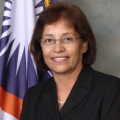
Dr. Hilda Heine
President of the Marshall Islands, 2016-2020; Member of Parliament, Aur Atoll Electoral District
Dr. Hilda Cathy Heine, EdD, served as the eighth President of the Republic of the Marshall Islands from 2016 to January 2020. She is the first woman to serve as president of the country and the first woman to serve as head of state in any of the five Micronesian countries of the North Pacific. Prior to becoming President, Dr. Heine was the nation’s Minister of Education, and she is currently a senator representing Aur Atoll.
Dr. Heine was the first person in the Marshall Islands to earn a doctorate degree. In 1987, she co-founded the women's rights group Women United Together Marshall Islands (WUTMI). She attended college in the United States where she earned her undergraduate degree at the University of Oregon. She earned a master's degree at the University of Hawai‘i, and an educational doctorate at the University of Southern California.
As President, Dr. Heine strongly appealed to and urged all countries to take action to mitigate climate change. The Marshall Islands comprise over a thousand low-lying islands and islets that are threatened by the effects of climate change, including rising sea levels and more frequent and extreme weather events such as droughts and floods.
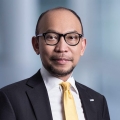
Dr. Muhamad Chatib Basri
Chairman, PT Bank Mandiri Tbk & PT XL-Axiata Tbk; Minister of Finance, 2013 – 2014, Republic of Indonesia
Dr. Muhamad Chatib Basri is a former Minister of Finance of Indonesia. Previously he was the Chairman of the Indonesian Investment Coordinating Board. Dr. Basri is now the Chairman of the PT Bank Mandiri tbk. and Chairman of the PT XL-Axiata tbk.
He is a member of various International Advisory councils including the High-Level Advisory Group on Sustainable and Inclusive Recovery and Growth formed by the World Bank and the IMF in the face of dual crisis posed by COVID-19 pandemic and climate change; the World Bank Advisory Council on Gender and Development; Group Eminent Personalities of the OECD Development Centre and the Advisory Board, Centre for Applied Macroeconomic Analysis, the Australian National University. He is also member of the Governing Board of the Lee Kuan Yew School of Public Policy, National University of Singapore.
He teaches at the Department of Economics University of Indonesia and co-founded CReco Research, a Jakarta based economic consulting firm.
Dr. Basri was Ash Centre Senior Fellow at the Harvard Kennedy School (2015-2016), Pacific Leadership Fellow at the Centre on Global Transformation, University of California at San Diego (2016), NTUC Professor of International Economic Relations, RSIS, NTU, Singapore (2016) and Thee Kian Wie Distinguished Visiting Professor at the Australian National University (2016-2017).
His expertise is International Trade, Macroeconomics and Political Economy. He is the author of a number of paper in international journals and actively writes for various leading newspapers and magazines in Indonesia.
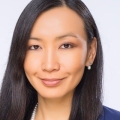
NEO Gim Huay
Managing Director, Centre for Nature and Climate, World Economic Forum
NEO Gim Huay is Managing Director and Head of the Center for Nature and Climate at the World Economic Forum. Before joining the Forum, she held various Managing Director roles in Temasek, including Climate Change Strategy, Sustainability and Enterprise Development. Gim Huay was responsible for seeding new businesses as well as working with Temasek’s existing portfolio of companies to build new capabilities. She also spearheaded Temasek’s sustainability and climate change strategy and initiatives.
Prior to joining Temasek, Gim Huay was a Management Consultant at McKinsey & Co in the Lagos, New York and San Francisco offices. She also served in the Singapore Public Service as an Administrative Officer, in the Ministry of Finance, Ministry of Trade and Industry, the Prime Minister’s Office as well as the Singapore Embassy in the United States. Gim Huay holds a Masters in Business Administration (Arjay Miller Scholar) from Stanford University and a Masters of Engineering (Distinction) and Bachelor of Arts (First Class Honors) from Cambridge University. She was selected as an Eisenhower Fellow in 2015.
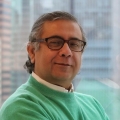
Vivek Pathak
IFC Director, Global Head Climate Business
Vivek Pathak has been passionate about climate for most of his career. In his current role, he takes inspiration from two of his strongest beliefs – that the world needs urgent action to combat climate change, and that addressing climate change will generate huge business opportunities for the private sector and capital markets.
As IFC’s Global Head and Director of Climate Business, Vivek looks for these opportunities and works to mobilize capital needed to move them forward. He also leads business development, guides standardsetting and new product design, and connects the dots across the corporation to mainstream the climate lens into all IFC’s business. He believes that the private sector will be key to greening major sectors of national economies – from energy and transport to agriculture and manufacturing – and is committed to helping clients who are working to move the needle on the low-carbon transition in their countries and communities.
Prior to his current role, Mr. Pathak was IFC’s Regional Director for East Asia and Pacific, where he led operations across 18 countries, reaching $4.2 billion in long-term investment in fiscal year 2020, and was one of the first at IFC to integrate climate into all aspects of the business. Before that, he was IFC’s Director and Global Head of Credit and Investment Risk. He had also held multiple leadership roles managing portfolio, credit risk, and business development in frontier markets at IFC, Bank of America and ABN AMRO Bank. He started his career in advertising, where he learned the importance of knowing your audience, and the power of words to change the world.
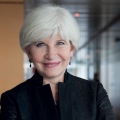
Laurence Tubiana
CEO, European Climate Foundation; Former French Ambassador for Climate Change Negotiations
Laurence Tubiana is CEO of the European Climate Foundation (ECF) and a Professor at Sciences Po, Paris. She previously chaired the Board of Governors at the French Development Agency (AFD), as well as the Board at Expertise France (The French public agency for international technical assistance). Beforejoining the ECF, Laurence was France’s Climate Change Ambassador and Special Representative for COP21, and as such a key architect of the landmark Paris Agreement. Following COP21 and through COP22, she was appointed UN High-Level Champion for climate action.
Laurence brings decades of expertise and experience in climate change, energy, agriculture and sustainable development, working across government, think tanks, NGOs and academia. She started her career as a Research Director for the French National Institute for Agricultural Research (INRA). In the 80’s and early 90’s she founded and then led Solagral, an NGO working on food security and the global environment. She founded in 2002 and directed until 2014 the Paris-based Institute of Sustainable Development and International Relations (IDDRI). From 1997 to 2002, she served as Senior Adviser on the Environment to the French Prime Minister Lionel Jospin. From 2009 to 2010, she created and then led the newly established Directorate for Global Public Goods at the French Ministry of Foreign Affairs (MAE). In 2013, she chaired the French National Debate on the Energy Transition. In 2018, President Macron appointed her to France’s High Council on Climate Change.Throughout the years, Laurence has held several academic positions, including as a Professor and Scientific Director for the International Development and Environmental Studies Master degrees at Sciences Po, Paris; and Professor of International Affairs at Columbia University, New York. She has been a member of numerous boards and scientific committees, including the Chinese Committee on the Environment and International Development (CCICED), and currently sits on advisory boards such as Iberdrola.

